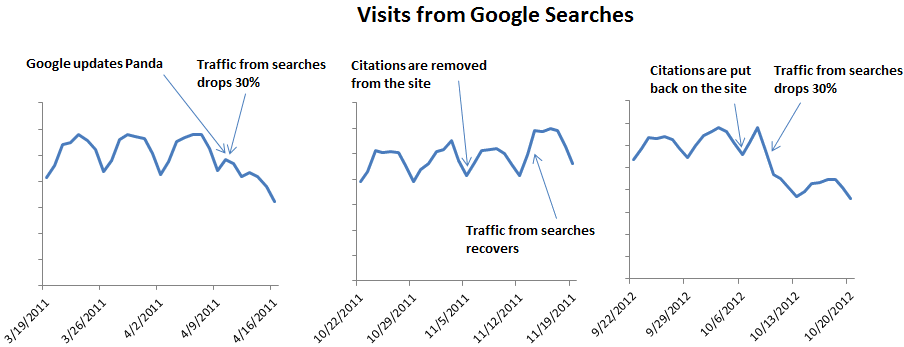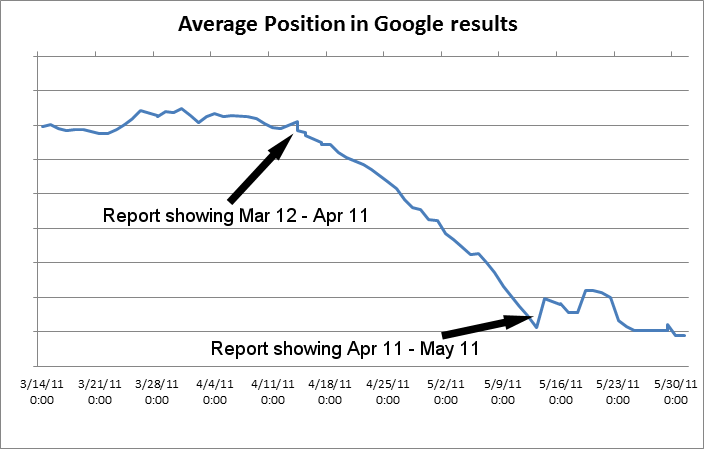Hi there,
Today marks the 365th day that Google has penalized The Online Slang Dictionary for showing citations of slang use gathered by hand from books, films, TV programs, and other sources. In protest - and to call attention to the penalty - the site has been blacked out.
There will be no Word of the Day today.
If you find the slang dictionary to be a useful resource, please help me in spreading the word about Google's penalty.
Thanks, and have a great day.
-- Walter (waltergr@aol.com)
P.S. What follows is information about the penalty. It's also available on the slang dictionary's website here.
Google and The Online Slang Dictionary
Summary
Google penalizes this site in search rankings when we show citations of slang use. Even
though every one of the 4,800 citations was removed more than 3 months ago, the penalty is
still in place because we used to show citations.
I would love to speak to someone at Google about this. My email, tweets,
and posts to Google's support forums have gone unanswered. I can be reached at
waltergr@gmail.com.
Why are citations important for a slang dictionary?
Being a dictionary of real slang terms, citations are how we show that the slang is
real. Citations serve the same purpose here as they do on Wikipedia: they provide evidence for
factual claims.
And while we're the only slang dictionary on the web with citations, there's a long history
of dictionaries having them. In the late 1800s, the project that would go on to publish the
Oxford English Dictionary had gathered two tons of citations, written on pieces of
paper.[1]
Do you have evidence of the penalty?
Yes.
In 2011, Google released a change to their ranking algorithms designed to penalize low-quality
websites. One thing Google now believes is an indicator of low quality is displaying excerpts
of content that exists elsewhere.
Despite citations being a hallmark of a high-quality dictionary, they get interpreted by
this change (called "Panda") as the complete opposite, because by their very definition
citations are content that exists elsewhere.
The following shows visits to this site from Google searches. The rest of this page
explains the data in more detail.

On this page
About The Online Slang Dictionary
Started in 1996, The Online Slang Dictionary is the oldest slang dictionary on the web.
Serving 1.8 million visitors each month, it provides more than 24,000 real definitions for over
16,000 slang words and phrases. The slang thesaurus - the only free slang thesaurus on the web -
has more than 600 categories of meaning. Unique features include usage voting, vulgarity
voting, and SlangMaps. Logged in users can add words and definitions - and edit existing
definitions.
The site has approximately 4,800 citations gathered by hand from TV programs, movies, news
publications, magazines and other sources - and added by hand to the appropriate definitions.
Details
Timeline
2011
- April 11: Google releases the "Panda" algorithm changes globally to all
English-speaking users, and starts penalizing this site.
- November 5: I remove all citations, largely as an experiment. I couldn't believe
Google would be penalizing a dictionary website because of the presence of citations.
- November 13: Google confirms that the citations are the cause by retracting the
penalty.
2012
- October 6: Believing I had identified a way to restore the citations without
incurring the penalty, I add them back to the site.
- October 9: Google resumes the penalty.
- November 16: To be able to compete with dictionary websites that don't have
citations, I once again remove
citations.
- November 16 - present: No response from Google. The penalty continues unabated.
Google penalizes The Online Slang Dictionary for showing citations: Part 1
Google's Panda changes are designed to penalize what Google's algorithms believe are
"low-quality" sites. Google released the Panda changes globally to all English-speaking users
on April 11, 2011. Visits to The Online Slang Dictionary that were the result of a Google
search dropped markedly on April 11, 2011.
This chart only shows traffic from Google searches.

The loss in traffic was limited to Google. No other traffic sources (other search engines,
direct traffic, or referral traffic) were affected. Such a drop is unprecedented for the site
since I began tracking site analytics in 2007.
Specifically, traffic declined because Google moved this site to a lower position in its
search results. Reports from Google Webmaster Tools show that the position of The Online Slang
Dictionary in Google search results fell on April 11, the date of the Panda penalty.

The reports that I have access to cover a time period of a month, rather than a single day. So
the effects of the penalty only start to become evident in the report dated March 12 - April 11.
The next dated report goes through April 12, so it includes 2 days of penalty. The subsequent
report includes 3 days of penalty, and so forth. As more days of the penalty are within the
date range of the report, the amount of the decline is increasingly revealed.
(Why the uptick at the end? Because the reports show a range, the final report that includes
April 11 is dominated by subsequent dates. There was a small uptick in ranking during those
dates - which did not restore traffic - then the ranking dropped back down.)
So as the data shows, The Online Slang Dictionary started receiving a penalty on April 11,
2011, and that's the date that the Panda changes were released to all English-speaking users
of Google.
Citations are removed
During the next seven months, I made dozens of structural changes and thousands of content
changes to the site - but
these changes had no effect on the amount of traffic referred by Google queries. I couldn't
believe Google would be penalizing the site because of the presence of citations. After all,
high-quality dictionaries have citations, and Google Panda was designed to penalize
low-quality websites.
Largely as an experiment, I removed every citation from the site on November 5, 2011. A
week and a day later - on November 13 - the penalty was rescinded.
This chart only shows traffic from Google searches.

Google penalizes The Online Slang Dictionary for showing citations: Part 2
The citations were then missing from the site for almost a year. In early October 2012, I
identified what I believed was a way to restore citations to the site without being penalized by
Google. The full inventory of citations - approximately 4,800 - returned to the site on
October 6, 2012.
The technical details of the citation restoration, are, in brief: to improve page speed by
avoiding an extra HTTP request, output citations inside HTML comments within the web page.
Use JavaScript to turn those HTML comments into visible text. Since Google doesn't index
content within comments, this seemed to be a clear way to tell Googlebot that the citations
shouldn't be used for indexing - or ranking - purposes.
The penalty returned 3 days later.
This chart only shows traffic from Google searches.

I tried a second approach: to not include any citations
in the HTML at all, but load a JavaScript file - from a directory blocked by robots.txt - that
splices the citations into their appropriate positions. Since the citations were loaded from a directory
blocked by robots.txt, this seemed to be a clear way to tell any compliant spiders that the
citations shouldn't be used for indexing - or ranking - purposes. This had no effect on the
site's ranking.
Citations are removed again
On November 16, in order to be able to compete with dictionary websites that don't have
citations, I once again removed all
citations. Hopefully this will cause the penalty to be lifted.
In the meantime, the penalty is ongoing, and is decimating traffic to The Online Slang Dictionary.
I would love to speak to someone at Google about this. My posts to Google's
support forums haven't received any traction. I can be reached at
waltergr@gmail.com.
Any suggestions?
I would love to speak to someone at Google about this. My email, tweets,
and posts to Google's support forums have gone unanswered. I can be reached at
waltergr@gmail.com.
Thanks for your time.
[1] History of the OED - Dictionary Editors, Oxford University Press.




